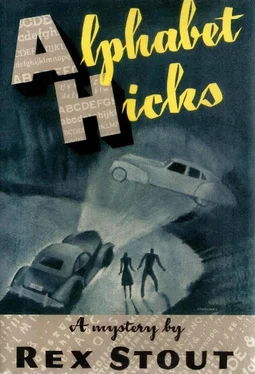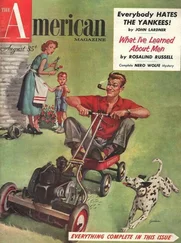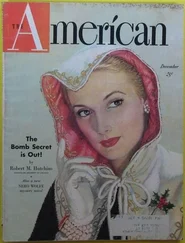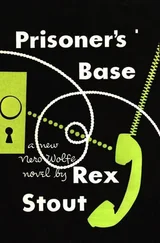“Please.”
Hicks crossed the living room and passed through an arch into the large reception hall, traversed that, and opened the door. He did not swing it hospitably wide, but only enough for the breadth of his own shoulders; and after one glance into the foyer he kept his shoulders there.
Hicks said, “Hello.”
The man in the foyer said, “Hello.”
Hicks said to the elevator boy, who had waited there in his open door for the bell to be answered, after the custom in apartments with private elevator foyers, “Everything is under control, thank you,” and, after a fleeting moment of hesitation, the boy let his door go shut and the hum of the descending car followed.
Hicks, still blocking the door, met the cold gaze of the small gray eyes of the visitor. “Tag?” he inquired.
The man shook his head. “I’m as surprised as you are. Maybe more. And interested. I’m here to see Mrs. R. I. Dundee.”
“She has a headache. I’ll be glad to give her a message.”
“I’d like to talk to her.”
“At this time of night?”
“This is the only time there is right now.”
“Wait a minute.”
Hicks closed the door in the man’s face, made sure it was locked, returned to the living room, crossed to the divan, and told Mrs. Dundee:
“It’s Mr. Manny Beck, chief of the Westchester County detectives.”
“What—” Her jaw dropped.
“He was there this afternoon. He’s investigating that murder. I don’t think he knows anything about your trouble with your husband. He says he didn’t follow me here, he came to see you, but I don’t know why. You can let him in or not as you please. If you don’t he’ll be back in the morning, and it might be more picturesque to take him on while I’m here. I came here, by the way, to discuss with you a confidential matter which is none of his business, and of course I have told you about the murder.”
Mrs. Dundee was sitting straight, her hands in her lap, the fingers interlaced, tight. “But I know nothing — What can he possibly—”
“Same here. Shall we find out?”
“Yes.”
“Good for you.” He patted her on the shoulder. “If he springs a surprise, shut your eyes and groan from your headache. I told him you’ve got one.”
He went back to the hall and opened the door and told Manny Beck:
“She really has got a headache, but you can have ten minutes with me present as timekeeper. To relieve your curiosity, she is interested in the job I’m doing for her husband, and I came to report on that. Naturally I told her about the murder.”
“Naturally,” Beck growled, and crossed the threshold.
If what Beck had was a surprise, it did not appear that he regarded it as one, for he made no effort to build up to it, and the question that revealed it came out quite casually. After acknowledging the introduction and taking the chair Hicks placed for him, he apologized, if not with urbanity, at least with civility, for intruding at that late hour, and even said he was sorry that Mrs. Dundee had a headache. Then he said he understood that Hicks had told Mrs. Dundee of what had occurred at the house at Katonah that afternoon.
She nodded, and pressed a palm to her forehead.
Beck asked, “Do you know Mr. George Cooper?”
“No.”
“Did you know his wife? Martha Cooper?”
“No. I’d never heard their names until Mr. Hicks told me a little while ago.”
“Yeah.” Beck scowled and then unscowled. “About Hicks telling you. I thought maybe you already knew about it.”
“About what?”
“What happened up there. The murder.”
“How could I?”
“I thought maybe it happened before you left. What time did you get there?”
Mrs. Dundee’s eyes widened. “What are you talking about? Get where?”
“Katonah. That house. This afternoon.”
Her eyes stayed wide. “I have never been to that house.”
“Before today?”
“This is ridiculous! I wasn’t there today.”
“You weren’t!”
“Certainly not!”
Beck emitted a grunt so skeptical as to be derisive. “Your son Ross phoned you at five minutes to six this afternoon, didn’t he?”
Her eyes went shut. “He—” The eyes opened again. “I don’t know what time it was that he phoned.”
“It was five fifty-five. He phoned from the extension in the upstairs hall. He asked you how and when you got there this afternoon, and what time you left, and you refused to tell him.”
“Wait a minute,” Hicks put in. “This is a—”
“It’s absurd,” Mrs. Dundee said scornfully. “I didn’t refuse to tell him. I told him he must be dreaming because I hadn’t been there.”
“And he said,” Beck growled, “that he knew you had been because he heard you talking.”
“Ah,” Hicks said.
“What?”
“I said ah.”
“Ah what?”
“Nothing. Go ahead. Two minutes left.”
“This,” Mrs. Dundee said emphatically, “is perfectly absurd. I told my son he couldn’t have heard me talking because I wasn’t there, and he said he must have been mistaken and told me to forget about it, and rang off.”
“Sure,” Beck agreed, “because he caught on that he was being overheard. So he hung up. Naturally he don’t want his mother mixed up in a murder investigation, and naturally you don’t want to be. Therefore, the best way to avoid that is to tell me what time you got there, and what you did, and how long you stayed.”
Mrs. Dundee looked at Hicks and said incisively, “This man is a fool.”
“No,” Hicks contradicted her, “he’s a little above the average. He merely has a bum steer. Do you remember, Beck, in the Atherton case I gave you my word that that bicycle you found in the pond had nothing to do with it? I give you my word now that Mrs. Dundee was not out there today. As a favor, to save you trouble.”
“Thanks,” Beck said in no tone of gratitude. “That settles it. Maybe, you think. People don’t go from New York to Katonah and back again on a magic carpet. Have you considered that?”
“Certainly. That’s what I meant about saving you trouble. If you won’t take my word for it—” Hicks shrugged. “The ten minutes is up. If there’s anything else you want to know, make it snappy.”
Beck stood up. His little gray eyes bored down at Mrs. Dundee. “If you weren’t involved in that business out there, Mrs. Dundee, you’re not acting sensible. Believe me. You’re not acting sensible.” He wheeled and stooped to tap Hicks’s knee with a blunt forefinger. “Listen, bub. You made a monkey out of me once. That’s enough. Once.”
He turned and marched off. Hicks followed him out to the door, and stayed there until the elevator arrived. Beck, entering it, turned and held up a stiff finger.
“Once,” he growled. “Plenty.”
The door slid across.
When Hicks got back to the living room Mrs. Dundee was bent over with her elbows on her knees and the heels of her palms pressed against her eyes. He sat down and folded his arms and regarded her with one side of his mouth screwed up. After a minute he said gruffly:
“I’ll beat it and you take another pill and go to bed.”
She shook her head. In a moment she raised it. “This is ghastly, simply ghastly.” Her voice had the metallic hardness that made it a new voice. “And that woman murdered — there — today — it’s simply grotesque!” She made a gesture. “Tell me. That record. Tell me...”
When Hicks left, at one o’clock, he had another check in his pocket, but no additional information of any importance. Mrs. Dundee had arrived at Vail’s office a little after twelve noon and spent twenty minutes there, receiving for her pains only cool courtesy and a flat denial that he had ever obtained Dundee trade secrets by any means whatever. The phone call from her son around six o’clock had lasted only a minute or so and had been as Beck had reported it. She had tried twice to call him back but the wire had been busy. She insisted that she had never been in Vail’s office before that day. She knew quite well what a sonotel was; indeed, one had been installed in her own apartment for purposes of experiment, until after a month she had insisted on its removal, something over a year ago.
Читать дальше












